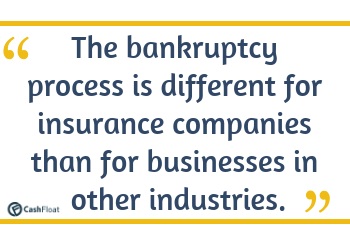Can an insurance company go bankrupt? Of course, they can! In this article from Cashfloat, we explore what happens when an insurance company goes bankrupt and how the FSCS steps in to help.

Can an Insurance Company go Bankrupt?
Luckily, it’s relatively rare for an insurance company to declare bankruptcy in the UK. That doesn’t mean that it never happens, though. And when it does happen, it’s important for those who have policies with the insurer to know which steps to take. Making the right moves and doing the right things in a timely manner can limit the damage and protect you. So, if you have no idea what you would do in the event of your insurer becoming insolvent and declaring bankruptcy, it’s time to learn more.
There are some safeguards in place that are designed to protect people who hold policies with insurance companies. The bankruptcy process is different for insurance companies than for businesses in other industries. These differences are important. It’s these that can help to protect people like you in the event of the insurance company going bankrupt. So, what happens if an insurance company goes bankrupt? And what should you do as a policyholder? Read on to find out all that information and more right now.


How Does the Bankruptcy Process Get Started?
Insurance companies cannot be wound up voluntarily. First, they have to get the consent of the Prudential Regulation Authority. This allows the PRA to get involved to make sure that everything is done to keep the company afloat for as long as possible. That’s something that can protect people who hold policies with the insurer.
A court can later place the company into administration if it can’t meet its obligations. This is when organisations like the Financial Services Compensation Scheme can get involved to help you. Policies have to be valued to see if there are assets available to refund customers. It’s difficult to evaluate policies, but it’s generally accepted that the value should be set when the company is wound up.
Policyholder Protection From the Financial Services Compensation Scheme
As a policyholder, the thing you will care about most is getting your hands on compensation. This is a perfectly natural way of feeling, but taking action is what’s most important. The Financial Services Compensation Scheme (FSCS) is the organisation that will be able to help you out. The FSCS is a pool of money that goes towards compensating anyone who is affected by the collapse of a financial company or institution. It can offer you compensation and also help you to find cover elsewhere. What outcome you get from the FSCS will depend on your precise situation. You are eligible if you have suffered financial loss due to the collapse of an insurance company. But the compensation does not extend to non-financial losses.
The FCSC puts its primary focus on helping individuals who have been harmed. But businesses, local authorities, and charities can be helped too. You have to be in the UK, but the Channel Islands and the Isle of Man are not covered. There are also compensation limits in place for anyone who makes a claim with the FSCS, but these relate to bank accounts and investments. Luckily for you, there is no upper limit to the amount of insurance protection you can get. That applies to any insurance companies that declared bankruptcy on 3 July 2015 or later. For compulsory forms of insurance, such as car insurance, 100% of your money is protected. However, although there is no upper limit on non-compulsory forms of insurance, only 90% of your money will be covered.

How to make a claim
Anyone who thinks that they are eligible and have a legitimate claim should get in touch with the FSCS. They will advise you on the steps to take and help you to carry your claim forward if it is legitimate. The process of getting the compensation that you require is complicated. So, get the help you need and don’t hesitate in contacting organisations like the FSCS, even if you’re not sure what to do. You can contact them via their website or call them up. Act quickly so you that you don’t fall into the trap of getting into financial trouble or relying on borrowing and short term loans online.
How Long Does the FSCS Process Take?
Bankruptcy processes are never exactly clean. In fact, they can get very messy indeed. Of course, this isn’t ideal, but that’s the way it is. For that reason, you shouldn’t expect a quick solution to your problem. In some instances, you might be lucky and get your compensation quickly. But there are so many factors that come into play, and they sometimes restrict the FSCS, making the process take longer. Having said that, the FSCS does have a good record for acting quickly and helping policyholders.
When an insurance company ultimately fails, the FSCS aims to get compensation claims paid within a week. There are some occasions when that’s not possible for a variety of reasons. Those cases that can’t be sorted within a week can take up to 20 days to resolve. And this only applies to claims against deposit takers. If you are claiming against investment firms or brokers (as we’ll look at below), this can take about six months. Don’t let that time scale put you off, though, because it’s still worth getting your hands on the money you’re owed.
Watch this video by the FSCS and learn how they helped one family whose house was destroyed by a flood and then their insurance company went bankrupt.
Broker liability
On top of all the things mentioned above, there is also the issue ofbroker liability. If you used a broker to get your insurance policy before that insurance company went bankrupt, the broker could be liable. The broker is legally required to offer the customer a skilled service. And if the broker provides the customer with a policy from a company that is not solvent, then the broker must be held to account. They are also required to warn the client about any financial problems that an insurance company might be facing. Without that information, a customer could sign a deal with an insurance company that is already on the brink of bankruptcy. So, be sure to give this some thought and talk to a lawyer if you think the broker you used acted unlawfully.
The following table brings you insurance companies in the UK which have gone bankrupt since 2010.
| Year | Insurance Company | Date |
|---|---|---|
| 2010 | The Exchange Insurance Company Ltd | 06/10/2010 |
| 2012 | Lemma Europe Insurance Company Limited | 05/10/2012 |
| 2013 | Millburn Insurance Company Ltd | 11/12/2013 |
| 2014 | European Risk Insurance Company hf. | 28/04/2014 |
| Balva AAS Insurance | 04/07/2014 | |
| 2016 | Enterprise Insurance Company PLC | 28/07/2016 |
| Gable Insurance AG | 22/11/2016 | |
| 2018 | Alpha Insurance A/S | 11/05/2018 |
| Horizon Insurance Company Ltd | 19/12/2018 | |
| Qudos Insurance A/S | 20/12/2018 | |
| Information taken from fscs.org.uk | ||
Conclusion
In this article, you have read about the process of an insurance company declaring bankruptcy and how insured customers can be affected. If you do find yourself making a claim from an insurance company that has gone bust be grateful that there is the FSCS keeping you covered. If you have an emergency that you need funding and can not wait until you are convered by your insurance, you can apply for an emergency payday loan from Cashfloat.


